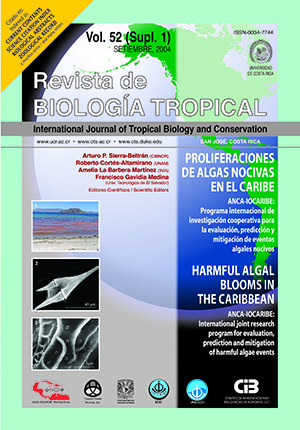Abstract
A red tide event occurred in El Salvador from August 2001 to January 2002. National health authorities usually measured toxin levels in Ostrea iridescens, however other species were analyzed during this microalgae bloom: Anadara similis, Anadara tuberculosa and Modiolus sp. El Salvador authorities consider 400 mouse units/100 g the highest value that is safe for human health. During this period toxin levels in O. iridescens and Modiolus sp. increased from values under 400 to 3 977 and 15 468 mouse units/100 g, respectively. Persistent and higher levels were recorded in oyster and mussel banks on the west part of the country. The Ministry of Health and Social Assistance treated 41 slight to moderate intoxications associated to bivalve mollusks consumption.A red tide event occurred in El Salvador from August 2001 to January 2002. National health authorities usually measured toxin levels in Ostrea iridescens, however other species were analyzed during this microalgae bloom: Anadara similis, Anadara tuberculosa and Modiolussp. El Salvador authorities consider 400 mouse units/100 g the highest value that is safe for human health. During this period toxin levels in O. iridescens and Modiolus sp. increased from values under 400 to 3 977 and 15 468 mouse units/100 g, respectively. Persistent and higher levels were recorded in oyster and mussel banks on the west part of the country. The Ministry of Health and Social Assistance treated 41 slight to moderate intoxications associated to bivalve mollusks consumption.
References
Alonso Picón, J.A. 1989. Mareas Rojas y Biotoxinas: Química y Epidemiología. Servicio Galego de Saúde, Consellería de Sanidade, Xunta de Galicia. Santiago de Compostela. 120 p.
Armero-Guardado, J.A. 2002. Brote de intoxicaciones paralíticas por mariscos, El Salvador, Agosto 2001 Enero 2002. Ministerio de Salud Pública y Asistencia Social, Unidad Nacional de Epidemiología. 6 p.
Azanza, R.V. & M. Taylor. 2001. Are Pyrodinium blooms in the Southeast Asian region recurring and spreading? Aview at the end of the millennium. Ambio 30: 356-362.
Gocke, K., J. Cortés & C. Villalobos. 1990. Effects of red tides on oxygen concentration and distribution in the Golfo de Nicoya, Costa Rica. Rev. Biol. Trop. 38: 401-408.
Mata, L., G. Abarca, L. Marranghello & R. Víquez. 1990. Paralytic shellfish poisoning (PDSP) due to Spondylus calcifer contaminated by Pyrodinium bahamense, Costa Rica, 1989-1990. Rev. Biol. Trop. 38: 129-136.
Rodríguez, D.C., R.A. Etzel, S. Hall, E. de Porras, O.H. Velásquez, R.V. Tauxe, E.M. Kilbourne & P.A. Blake. 1990. Lethal Paralytic Shellfish Poisoning in Guatemala. Am. J. Trop. Med. Hyg. 42: 267-271.
##plugins.facebook.comentarios##

This work is licensed under a Creative Commons Attribution 4.0 International License.
Copyright (c) 2004 Revista de Biología Tropical


